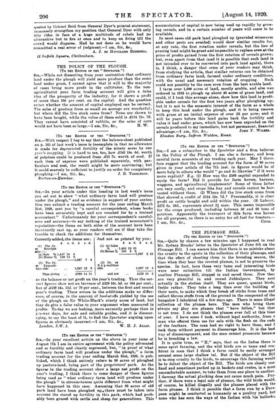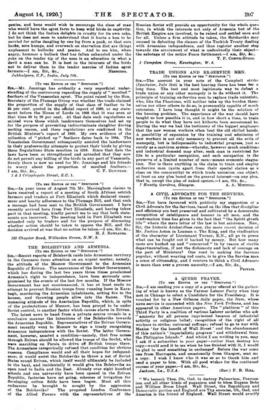THE PLUMAGE BILL.
rro THE EDITOR OF THE "-SPECTATOR.") SIR,—Quite by chance a few minutes ago I happened to read Mr. Sydney Brooks' letter in the Spectator of Tune 5th on the Plumage Bill. I can assure him that there is no mistake about the cruelty to the egrets in the collection of their plumage, and that the effect of shooting ahem in the breeding season, the time when they bear the coveted plumes, is not to preserve the species. In fact, here these very tame and interesting birds were near extinction till the Indian Government, by another Plumage Bill, stepped in and saved them. Now they are very plentiful in and round Jubbulpore. They nest actually in the station itself. They are queer, quaint birds, feeble rather. They take a long time over the building of their nests, to make which they break off sticks from trees and collect fibrous staffs from off the ground in the compound of the bungalow I inhabited till a few days ago. There is some illegal collection of the plumes here. The men who bring them always say they are plumes that "have fallen," but that is not true. I do not think the plumes ever fall at this time of year. I have some I took, without legal authority, from a man who offered them me for sale with the flesh on the ends of the feathers. The man had no right to have them, and I took them without payment to discourage him. It is the best way of discouragement, and the man cannot prosecute because he is breaking a law.
It is quite true, as "H." says, that on the Indus there is some egret farming, and the wild birds are so tame and con- fident in man that I think a farm could be easily arranged around some large shallow tal. But if the object of the Bill is to stop cruelty to the birds, to encourage this farming would be to defeat the object of the Bill. The birds are closely con- fined and sometimes packed up in baskets and crates, in a most uncomfortable manner, to take them from one place to another. I daresay the actual plucking does not cause much pain. Fur- ther, if there were a legal sale of plumes, the wild birds would, of course, be killed illegally and the plumes placed with the farm plumes. I think it possible that a farm run by a Earo- peen might be conducted as humanely as a poultry yard, but none who has seen the ways of the Indian with his bullocks,
ponies, and hens would wish to encourage the class of man who would have the egret farm to keep wild birds in captivity. I do not think the Indian delights in cruelty for its own sake, but he does not seem to understand that it hurts a hen to be carried for miles dangling by one leg from a pack, or that sore backs, sore humps, and overwork on starvation diet are things unpleasant to bullocks and ponies. And to see him, when angry, hammer a bullock that has fallen exhausted under the yoke on the tender tip of the nose is an education in what a devil a man can be. It is beet in the interests of the birds not to deliver them to the tender mercies of Indian egret
farmers.—I am, Sir, &c., NERMIDDA.
Jubbulpore, C.P., India, July 7th.



































 Previous page
Previous page